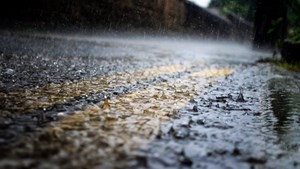How to keep you and your home safe during a storm
6 minute read

Bad weather can include heavy rain, strong winds, and even flooding. If you know a storm is due in your area, it can be helpful to keep in mind these helpful tips to keep your home and family safe.

Over 50s Home Insurance
Age Co helps you protect the things you love. We’re 100% owned by Age UK and our profits go back to the charity.
In this guide, we’ll look at what preparations you can make to limit the damage a storm can inflict on your property. Storms vary in severity, so we’ll also break down the classification system used by The Met Office. This should help you understand when bad weather is serious enough to warrant taking action. Should any damage to your property occur, we’ll also cover how to report this to your insurance provider.
How do I know if a storm is coming?
If you want to know if a storm is approaching your area, then we recommend checking The Met Office’s weather forecasts. They use a colour code system to indicate if severe weather is due.
The Met Office codes explained
- Yellow: likely the weather will cause some low level impacts, such as travel disruption.
- Amber: increased likelihood of impacts and severity, such as road and rail closures, power cuts, and some potential risk to your safety and property.
- Red: dangerous weather is expected, and you should take action to keep yourself and others safe. It will be very likely there will be a risk to your safety, with substantial disruption to travel, energy supplies and possibly widespread damage to infrastructure
How to safeguard your home against a storm
If you find out a storm is approaching there are some precautions you can take to potentially prevent your home from being damaged.
Prune branches and trim trees
If you are able to, get rid of any loose or dead branches near your home or garden’s outbuildings. These can be a hazard in any windy weather. For any precarious tree branches, it’s recommended you either reach out to a professional tree surgeon or consult your local authority. They’ll be able to advise on how to carry the work out safely, as well as let you know if a certain specimen comes under Tree Preservation Orders (TPO).
Secure any outdoor objects
Before a storm hits, it's a good idea to assess your garden for any items that need to be secured or put away. Lights, ornaments, toys, wheelie bins and other small items that might be blown away are best brought inside or placed in a shed.
For larger items, such as tables or trampolines, if they can’t be dismantled and put into storage, then you might consider tying them down - kits can be purchased online.
Special attention should also be paid to your fence, as this will bear the brunt of any high winds. If possible, try to make any repairs before the storm arrives, such as reinforcing weak spots and making sure there’s adequate drainage around the base to stop pooling water from rotting the wood.
Check your roof*
If you have easy and safe access to your roof, then it can be worthwhile to check for any weak spots before a storm arrives. You could also consult with a roof specialist if you can’t safely gain access and they’ll be able to advise on the following:
- Whether any leaks are present
- If there are any loose or cracked tiles
- If your supports are strong enough, such as walls and eaves
- The seals on your skylights and roof windows
Assess your gutters and drains*
Heavy rains could put your guttering and drains to the test. You might want to check to see if yours aren’t compromised by blockages, such as leaf or moss build-up. Similarly, a strong wind could cause damage to your walls, if the joints aren’t in a condition to withstand them.
Move your car to a safe spot
If you have a garage, it is recommended that you park your car inside and firmly secure the door. Otherwise, you might be able to minimise any damage by finding a parking spot that is clear of trees, garden furniture, or unstable-looking fences.

Keeping you and your family safe during a storm
Most storms won’t pose a physical threat. However, this doesn’t mean you shouldn’t exercise caution while they play out. To stay safe during bad weather, remember these top tips:
- Try to stay indoors and avoid driving as much as possible
- If you do have to leave the house, try to avoid walking near trees or around unsafe structures, such as building sites
- Don’t attempt to make any repairs to damaged property while the storm is active
- If you must drive, do your best to limit crossing bridges and going down elevated open roads
- In case of floods, move important possessions upstairs and keep your valuables (as well as your insurance details) in a waterproof container
- If you live alone, arrange for someone to check in on you throughout the day, either in person or by telephone - you might even consider purchasing a personal alarm
- In the event of power outages, have alternate heating/lighting to hand, food in your house that doesn’t require cooking to eat, and make sure your phone is fully charged
What to do if your home has been damaged
Once the storm has passed, it’ll be safe for you to check for any damage. Should your home have been affected then you’ll want to let your insurer know as soon as possible if you wish to make a claim. The details of how to start the claims process will be in your policy documents, so make sure you have these to hand.
If the damage to your home requires you to find temporary accommodation, such as after flooding, check your home insurance policy for an ‘alternative accommodation allowance’. This will be the maximum amount your insurer will pay out for any move you have to make, and knowing the budget can provide peace of mind.
Organising home repairs
If you have home emergency help included in your cover, then your insurer will be able to step in and provide access to approved tradespeople to make damage limitation repairs.
If you need to get a professional in to make temporary repairs, you’ll want to keep a detailed record of what repairs were made, costs, and paperwork. Should your insurance cover this work, then you’ll need these details to get your claim paid out quickly.
Summary
If a storm is heading in your direction, you may find it helpful to keep these key points in mind:
- Keeping trees pruned away from the house and your gutters clear throughout the year can help minimise damage when bad weather hits.
- Before a storm, move outside furniture and ornaments inside or tie them down. Likewise, park your car either in a garage or away from unstable objects, such as trees or fences.
- When a storm hits, stay indoors as much as possible.
- If any damage takes place during a storm, alert your home insurance provider as soon as possible – they may be able to arrange repairs and alternative accommodation, depending on your level of cover.
*Always be cautious when undertaking any DIY task that you aren’t familiar with, seek professional help where needed.

Sign up to the Age Co Newsletter
Each month, our email newsletter delivers inspiring stories, practical guides to later life, plus the latest news about Age Co and the charitable work we support.
